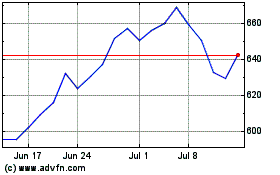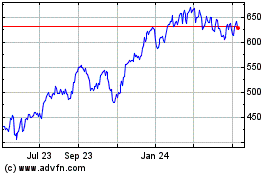Credit Karma in Talks to Sell Tax-Preparation Business to Square
October 30 2020 - 10:44AM
Dow Jones News
By Peter Rudegeair and Cara Lombardo
Credit Karma Inc. is in talks to sell its tax-preparation
business to Square Inc., according to people familiar with the
matter, a move meant to head off potential antitrust objections to
the personal-finance portal's pending $7.1 billion sale to TurboTax
maker Intuit Inc.
Terms of the potential deal couldn't be learned. A sale of the
unit would require approval from the Justice Department, which is
concerned that bringing together Credit Karma's small but growing
tax-preparation business with industry-leading TurboTax would leave
taxpayers with fewer, and potentially pricier, e-filing options,
the people said.
Credit Karma, best known for its website and app where more than
100 million users look up their credit scores for free, expanded
into tax services via a 2016 acquisition. The San Francisco-based
company doesn't charge anything for the e-filing service; rather,
the income information Credit Karma gleans from users' taxes helps
it fine-tune its main business of recommending credit cards and
loans.
Square, the financial-technology company run by Twitter Inc.
Chief Executive Jack Dorsey, helps small businesses accept credit-
and debit-card payments. Credit Karma's tax business would augment
Square's Cash App offering, a bank-account alternative that lets
consumers transfer money and buy bitcoin from their
smartphones.
Do-it-yourself software has displaced accountants for many
American tax-filers. Nearly 72 million individuals prepared their
own taxes and filed them online for the 2020 season, a 25% increase
from 2019, according to Internal Revenue Service figures. The
number of returns prepared by tax professionals and filed online
fell slightly to about 80 million.
But online tax preparers have been criticized for not acting in
consumers' best interests. In a series of articles last year that
drew the attention of lawmakers, ProPublica reported that TurboTax
steered low-income taxpayers, who would have been eligible to file
their federal tax returns for free, into paid versions of its
software. An outside review commissioned by the IRS found that some
of the companies that participated in a program to prepare taxes
for millions of filers at no charge used coding that hid free
offerings from online searches.
The Justice Department's antitrust enforcers have focused their
attention on financial and technology companies. In recent weeks,
federal prosecutors filed a blockbuster antitrust lawsuit against
Google over its search-engine practices and lined up witnesses for
a potential lawsuit to block Visa Inc.'s $5.3 billion acquisition
of startup Plaid Inc.
The department needs to "take a fresh look at how new
technologies are changing the competitive dynamics in these
industries, particularly the financial-services industry that is
key to every American consumer and small business," Assistant
Attorney General Makan Delrahim told The Wall Street Journal in
August.
Credit Karma has spent recent months looking to find a buyer for
the tax business. Based on feedback from the government, Credit
Karma targeted potential bidders that have the financial
wherewithal and strategic vision to grow tax businesses, people
familiar with the matter said. Square appears to satisfy those
conditions.
Intuit executives have said that Credit Karma's large user base
and its tools to manage consumer borrowing and saving were the big
drivers of its takeover offer, not Credit Karma's tax-prep
business. Intuit's two personal-financial management offerings,
Mint and Turbo, have less than half as many users as Credit
Karma.
Brent Kendall contributed to this article.
(END) Dow Jones Newswires
October 30, 2020 10:29 ET (14:29 GMT)
Copyright (c) 2020 Dow Jones & Company, Inc.
Intuit (NASDAQ:INTU)
Historical Stock Chart
From Mar 2024 to Apr 2024

Intuit (NASDAQ:INTU)
Historical Stock Chart
From Apr 2023 to Apr 2024
